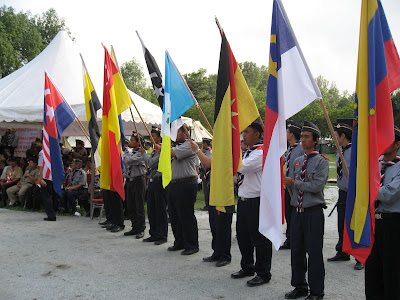The Patrol System is the one essential feature in which Scout training differs fromthat of all other organisations, and where the System is properly applied, it is absolutely bound to bring success. It cannot help itself!
The formation of the boys into Patrols of from six to eight and training them as separate units each under its own responsible leader is the key to a good Troop.
The Patrol is the unit of Scouting always, whether for work or for play, for discipline or for duty.
An invaluable step in character training is to put responsibility on to the individual. This is immediately gained in appointing a Patrol Leader to responsible command of his Patrol. It is up to him to take hold of and to develop the qualities of each boy in his Patrol. It sounds a big order, but in practice it works. Then, through emulation and competition between Patrols, you produce a Patrol spirit which is eminently satisfactory, since it raises the tone among the boys and develops a higher standard of efficiency all round. Each boy in the Patrol realizes that he is in himself a responsible unit and that the honour of his group depends in some degree on his own ability in playing the game.
Patrol Leaders' Council - Court of Honour
The Patrol Leaders' Council and Court of Honour is an important part of the Patrol System. It is a standing committee which, under the guidance of the Scoutmaster, settles the affairs of the Troop, both administrative and disciplinary. It develops in its members self-respect, ideals of freedom coupled with a sense of responsibility and respect for authority, while it gives practice in procedure such as is invaluable to the boys individually and collectively as future citizens.
The Patrol Leaders' Council takes charge of routine matters and the management of such affairs as Troop entertainments, sports, etc. In this Council it is often found convenient to admit the Seconds (Assistant Patrol Leaders) also as members, and, while getting their help, this incidentally gives them experience and practice in committee procedure. The Court of Honour, on the other hand, is composed solely of Patrol Leaders. The Court of Honour, as its name implies, has a rather exceptional mission, such as dealing with cases of discipline and questions of awards.
Values of the Patrol System
It is important that the Scoutmaster recognise the extraordinary value which he can get out of the Patrol System. It is the best guarantee for permanent vitality and success for the Troop. It takes a great deal of minor routine work off the shoulders of the Scoutmaster.
But first and foremost: The Patrol is the character school for the individual. To the Patrol Leader it gives practise in Responsibility and in the qualities of Leadership. To the Scouts it gives subordination of self to the interests of the whole, the elements of self-denial and self-control involved in the team spirit of cooperation and good comradeship.
But to get first-class results from this system you have to give the boy leaders real free-handed responsibility if you only give partial responsibility you will only get partial results. The main object is not so much saving the Scoutmaster trouble as to give responsibility to the boy, since this is the very best of all means for developing character.
The Scoutmaster who hopes for success must not only study what is written about the Patrol System and its methods, but must put into practice the suggestions he reads. It is the doing of things that is so important, and only by constant trial can experience be gained by his Patrol Leaders and Scouts. The more he gives them to do, the more will they respond, the more strength and character will they achieve.









